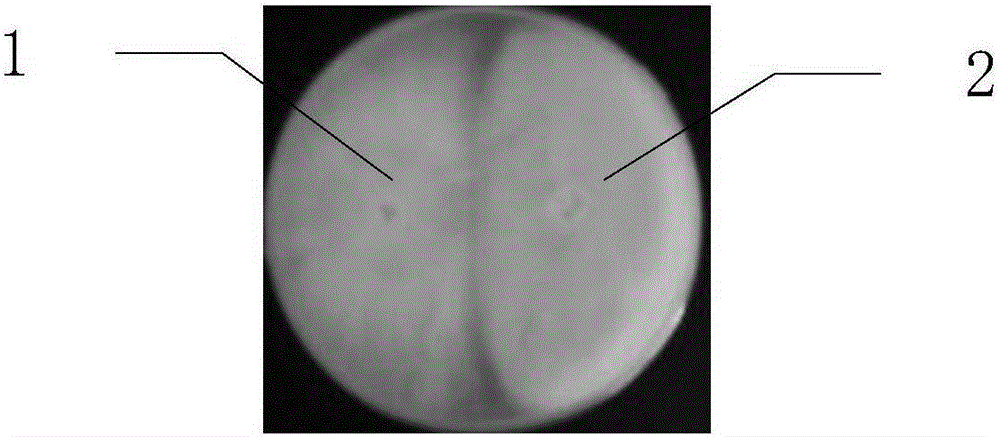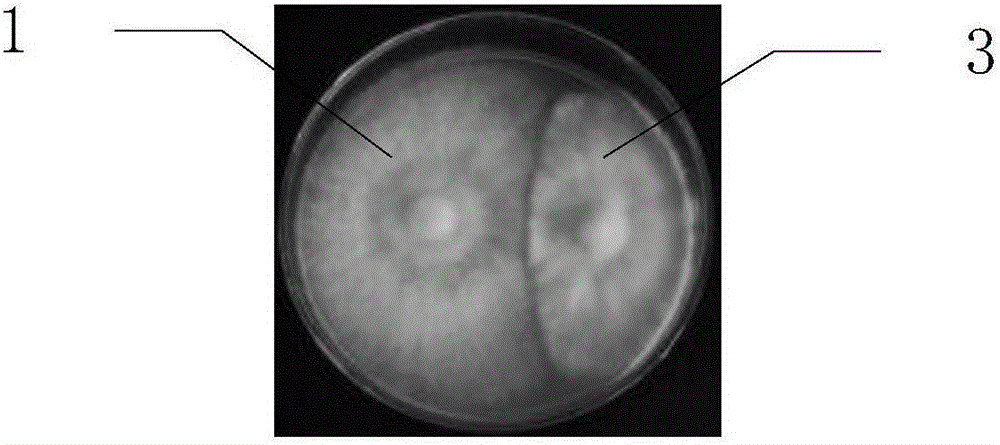Lyophyllum decastes strain Finc-L6 and cultivation method and application thereof
A lotus-leaf Umbrella, finc-l6 technology, applied to the lotus-leaf Umbrella Finc-L6 strain and its cultivation field, can solve the problems of difficulty in selective breeding, prolong the culture period, etc. The effect of short cultivation period and lower production cost
- Summary
- Abstract
- Description
- Claims
- Application Information
AI Technical Summary
Problems solved by technology
Method used
Image
Examples
Embodiment 1
[0054] Embodiment 1 hybridization obtains Finc-L6
[0055] Finc-L6 was obtained by cross breeding method.
[0056] Specific steps are as follows:
[0057] 1) Select parental strains: select the strains Finc-LD-2 and Finc-LD-3 domesticated by Shanghai Fengke Biotechnology Co., Ltd. as parents;
[0058] 2) Prepare mother seed culture medium, original seed culture medium and cultivar culture medium: the formulations of each culture medium have been given, and will not be repeated here;
[0059] 3) Isolation of basidiospores: place the caps of Finc-LD-2 and Finc-LD-3 in a petri dish respectively, after 24 hours, collect the spores falling on the petri dish, and dilute them into an appropriate amount in sterile water. Concentration, and spread on the PDA medium plate. Cultivate at 23°C for 25 days, and inoculate PDA slant test tubes with inoculation loops after the spores germinate. These tubes were incubated at 23°C for 25 days, after which hyphae were isolated from the tubes ...
Embodiment 2
[0063] Embodiment 2 Antagonism experiment
[0064] Finc-L6 of the present invention, 2 parent strains Finc-LD-2, Finc-LD-3 and 2 control strains Finc-LD-3, Finc-LD-4 are test materials, and the medium used is PDA medium.
[0065] Finc-L6, Finc-LD-1, Finc-LD-2, Finc-LD-3, and Finc-LD-4 were inoculated and cultured on the plate medium respectively. The distance between the inoculation points was 2.5 cm, and they were cultured at 23°C for 25 days. , see Table 1 for the test results.
[0066] Table 1 Antagonism test among different strains
[0067] Variety Finc-LD-1 Finc-LD-2 Finc-LD-3 Finc-LD-4 Finc-L6 antagonistic antagonistic antagonistic antagonistic
[0068] Such as Figure 1-8 As shown, there are obvious antagonistic lines between Finc-L6 and Finc-LD-1, Finc-LD-2, Finc-LD-3, and Finc-LD-4 at the junction of confrontation culture colonies, indicating that Finc-L6 is related to Finc-LD-1, Finc-LD-2, Finc-LD-3, and Finc-LD-4 are different ...
Embodiment 3
[0069] Embodiment 3 cultivation experiment
[0070] The lotus-leaved mushroom strain Finc-L6 of the present invention, parent strains Finc-LD-2 and Finc-LD-3, and existing varieties Finc-LD-1, Finc-LD-4 are cultivated and cultivated respectively, each 500 bottles of the bacterial strain were cultivated, and then the results of small batch cultivation were summarized and compared, and the advantages and characteristics of the bacterial strain Finc-L6 of the present invention were summarized.
[0071] The culture medium of this embodiment participates in the cultivar culture medium, and will not be repeated here.
[0072] Cultivation bottle volume: 850cc, bottle mouth diameter 58mm.
[0073] Cultivation: temperature 23~28℃, air relative humidity 75%, carbon dioxide concentration 2000~3500ppm;
[0074] Cultivation: The fruiting temperature is set at 15°C-18°C, the relative air humidity is 93%-100%, the carbon dioxide concentration is 1000-2000ppm, the light intensity is 10-50Lu...
PUM
 Login to View More
Login to View More Abstract
Description
Claims
Application Information
 Login to View More
Login to View More - R&D
- Intellectual Property
- Life Sciences
- Materials
- Tech Scout
- Unparalleled Data Quality
- Higher Quality Content
- 60% Fewer Hallucinations
Browse by: Latest US Patents, China's latest patents, Technical Efficacy Thesaurus, Application Domain, Technology Topic, Popular Technical Reports.
© 2025 PatSnap. All rights reserved.Legal|Privacy policy|Modern Slavery Act Transparency Statement|Sitemap|About US| Contact US: help@patsnap.com



